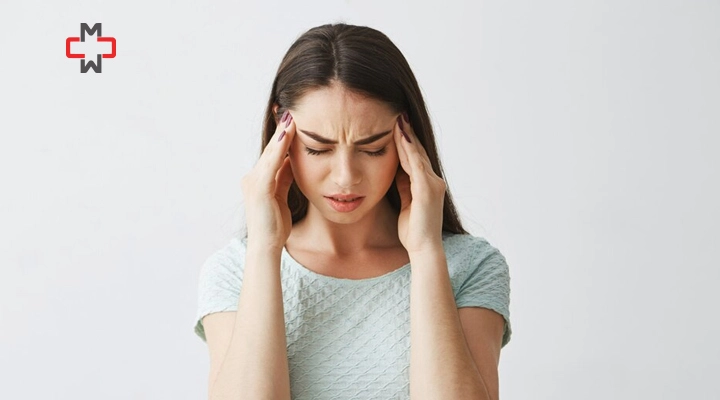Have you ever wondered if the constant headaches that you’ve been going through could be linked to something more than just stress or lack of sleep?
Could it be high cholesterol? Does high cholesterol cause headaches? – Are high cholesterol headaches even a thing?
Let’s find out the answer to this intriguing question and separate fact from fiction.
What Is High Cholesterol?
Cholesterol, often demonized but essential for bodily functions, is a waxy substance found in the blood. It’s produced by the liver and also comes from the foods we eat.
When cholesterol levels exceed healthy limits, it can lead to a condition known as high cholesterol or hypercholesterolemia.
What Does High Cholesterol Do To The Body?
Excess cholesterol in the bloodstream can lead to the buildup of plaque on the artery walls, a condition called atherosclerosis. This buildup narrows the arteries, restricting blood flow and increasing the risk of cardiovascular disease and stroke.
Can High Cholesterol Cause Headaches?
While headaches are often attributed to various causes, the link between high cholesterol and headaches is not well-established. Some studies suggest a potential association, but further research is required to confirm a direct cholesterol headache relationship. However, individuals with atherosclerosis, a consequence of high cholesterol, may experience headaches due to reduced blood flow to the brain.
What Other Symptoms Are Caused By High Cholesterol?
High cholesterol often doesn’t show any noticeable symptoms until it becomes a much more severe condition. However, some individuals may experience symptoms such as:
Treating High Cholesterol Headaches
Headaches can be a very discomforting symptom, especially when they’re associated with an underlying health issue like high cholesterol. While addressing the root cause is crucial, there are several effective strategies for managing and getting rid of the headaches caused by high cholesterol:
– Lifestyle Modifications:
- Healthy Diet: Adopting a diet rich in fruits, vegetables, whole grains, and lean proteins can help lower cholesterol levels and reduce headache severity.
- Exercise Regularly: Engaging in regular physical activity can improve circulation, lower cholesterol, and relieve stress, all of which contribute to headache relief.
- Weight Management: Maintaining a healthy weight through diet and exercise can help reduce cholesterol levels and alleviate high cholesterol headaches.
– Medication:
- Cholesterol-Lowering Drugs: Your healthcare provider may prescribe medications such as statins, bile acid sequestrants, or PCSK9 inhibitors to lower cholesterol levels and prevent the buildup of plaque in the arteries.
- Pain Relief Medications: Over-the-counter pain relievers like ibuprofen or acetaminophen can provide temporary relief from cholesterol headaches.
– Stress Management:
- Relaxation Techniques: Practicing relaxation techniques such as deep breathing, meditation, yoga, or tai chi can also help reduce stress levels and alleviate tension headaches associated with high cholesterol.
- Massage Therapy: Regular massage sessions can help relax tense muscles, improve circulation, and reduce the headaches.
– Regular Monitoring and Follow-Up:
- Cholesterol Screenings: Regular cholesterol screenings are essential for monitoring cholesterol levels and assessing the effectiveness of treatment.
- Follow-Up Visits: Schedule regular follow-up visits with your healthcare provider to track your progress, discuss any concerns or changes in symptoms, and adjust your treatment plan as needed.
When Is Cholesterol Dangerously High?
Cholesterol levels are typically measured in milligrams per deciliter (mg/dL) of blood. Ideal cholesterol levels vary depending on individual risk factors, but in general:
- Total cholesterol: Less than 200 mg/dL
- LDL cholesterol (bad): Less than 100 mg/dL
- HDL cholesterol (good): Greater than 60 mg/dL
Levels above these thresholds may indicate high cholesterol and an increased risk of cardiovascular disease.
When to See a Doctor?
Regular cholesterol screenings are recommended for adults, especially those with risk factors such as obesity, diabetes, or a family history of heart disease.
Additionally, seek medical attention if you experience:
- Persistent headaches
- Chest pain
- Shortness of breath
- Difficulty speaking or understanding speech
- Numbness or weakness in one side of the body
Conclusion
While high cholesterol is a significant risk factor for cardiovascular disease, its direct association with headaches remains uncertain. However, managing cholesterol levels through lifestyle modifications, medication, and regular screenings is essential for overall health and well-being.
If you’re experiencing persistent headaches or other concerning symptoms, don’t hesitate to reach out to Manhattan Medical Arts for personalized care and guidance.
– Disclaimer –
This blog is for informational & educational purposes only, and does not intend to substitute any professional medical advice or consultation. For any health related concerns, please consult with your physician, or call 911.
-
About The Author
Dr. Syra Hanif M.D.Board Certified Primary Care Physician
Dr. Syra Hanif is a board-certified Primary Care Physician (PCP) dedicated to providing compassionate, patient-centered healthcare.
Read More









